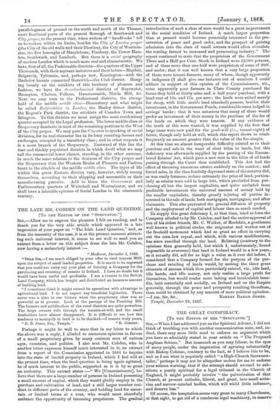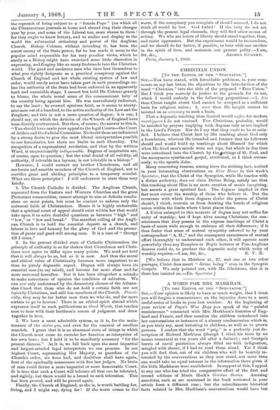THE GREAT CONSPIRACY.
[To THE EDITOR OF THE "SPECTATOR."] SIR,—When I last addressed you on the Spiritual Advent, I did not think of troubling you with another communication soon, and, in- deed, there may seem little need to enforce an argument which you have so admirably stated in your article on " The Proposed; Anglican Schism." But inasmuch as you may labour, in the eyes of many people, under the imputation of agreeing substantially with Bishop Coleus°, contrary to the fact, as I believe this to be, and as I am what is popularly called " a High-Church Sacramen- talist," perhaps it may not be altogether useless for me to endorse- your solemn warning, that if the attempt should succeed to sub- stitute a purely spiritual for a legal tribunal in the Church of England, it might probably involve " the pulverization of that Church, at present catholic, liberal, and great, into small secta- rian and narrow-minded bodies, which will wield little influence,. and deserve less."
Of course, the temptation seems very great to many Churchmen; at first sight, to get rid of a cumbrous legal machinery, to, remove the reproach of being subject to a " female Pope " (on which all the Ultramontane journals at home and abroad ring their changes year by year, and some of the Liberal too, more shame to them ! for they ought to know better), and to realize and display to the world the substantial orthodoxy and power of the Anglican Church. Bishop Colenso, without intending it, has been the sorest enemy of the State power, for he has made it seem to the popular mind responsible for his very peculiar views, which he surely as a Bishop might have exercised some little discretion in expressing, and flinging like so many firebrands into the Christian world. The good and moderate men who have lent themselves to what you rightly designate as a practical conspiracy against the 'Church of England and her whole existing system of law and .order, would surely never have taken part in such proceedings un- less the authority of the State had been enforced in an apparently bard and unamiable shape. I cannot but hold Dr. Colenso gravely to blame, the whole moral sense of the communicant laity of the country being against him. He was marvelously indiscreet, to say the least ; he avowed opinions fatal, as it seems to ninety- nine men out of a hundred, to the active authority of the Law and the Prophets; and this is not a mere question of degree; it is one, I should say, on which the Articles of the *Church of England have been directly contravened. But then, of course, the answer to this is, "You should have made your appeal to the legal Courts—the Court -of Arches and theJudicial Committee. No doubt these are influenced by a strong desire to give the most liberal interpretation possible to our formularies, but there are limits to such liberality. The -recognition of a supernatural revelation, and that by the written Word, is unquestionably indispensable. Degrees of inspiration are, .of course, open to question ; but the total denial of all validity, all authority, if tolerable in a layman, is not tolerable in a bishop."
However, I would entreat my brother Churchmen, and all -moderate and sensible members of the Church of England, not to sacrifice great and abiding principles to a temporary scandal. What are these principles ? I will endeavour to state them very briefly.
1. The Church Catholic is divided. The Anglican Church, separated from the Eastern and Western Churches and the great Protestant communities, cannot attempt to aim at definite conclu- sions on moot points, but must be content to enforce only the universal faith of Christendom. Hence it is highly undesirable that a spiritual court of appeal should exist within her that would take upon it to solve doubtful questions as between " high " and -" low," or " low and broad." The manifest calling of the Angli- can Church is to hold the essential deposit as a church, and -labour in love and honesty for the glory of God and the promo- tion of peace and good-will among men. It is a case of " Occupy till I come."
2. Iu the present divided state of Catholic Christendom the ,principle of authority is so far shaken that Churchmen and Chris- tians must agree to differ upon many points. We need not hold that it will always be so, but so it is now. And thus the moral .and ethical value of Christianity becomes more important to us than its purely dogmatic aspect. Dogma will always have its essential uses (to my mind), and become far more clear and far more universal hereafter. But it has been altogether a mistake to make correctness of opinion the condition of salvation. We can now only understand by the damnatory clauses of the Athana- sian Creed that those who do not hold a certain faith are not logically Christians, and still less members of the Church. Practi- cally, they may be far better men than we who do, and far more certain to go to heaven ! There is an ethical spirit abroad which .expresses itself in such publications as Good Words, that teaches men to bear with their brethren's errors of judgment and draw together in love.
3. We have a most admirable system, as it is, for the main- tenance of the status quo, and even for the removal of needless scandals. I grant that it is an abnormal state of things in which the Church must cease to exercise her function as interpreter of her own laws ; but I hold it to be manifestly necessary " for the present distress." As it is, we fall back upon the most impartial and largest-minded legal interpreters we can procure. In our highest Court, representing Her Majesty, as guardian of the Church's order, we have had, and doubtless shall have again, four of the spiritually coassessors with five law judges. No brain of man could devise a more impartial or more honourable Court. It is true that such a Court will tolerate all that can be tolerated, and rightly, but there would be a bound to such toleration. This has been proved, and will be proved again.
Finally, the Church of England, as she is, is worth battling for, diving, and I might say, dying for ! If the worst comes to the
worst, if the conspiracy you complain of should succeed, I do not think all would be lost. God forbid ! If the laity do not act through the present legal channels, they will find other means of acting. We who are lovers of liberty should stand together, then, and resist oppression. But the experiment would be tremendous, and we should do far better, if possible, to bear with one another in the spirit of love, and maintain our present polity.—I am,









































 Previous page
Previous page